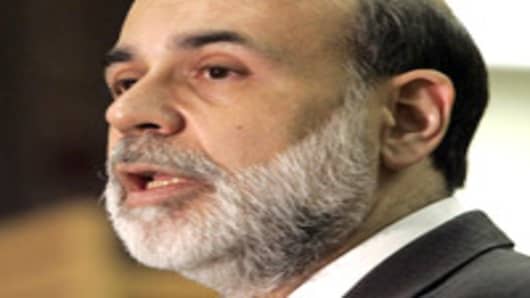A newly created federal corporation in essence took responsibility of billions of dollars of bad loans and devalued real estate assets, which were then auctioned off to private buyers.
This time, the government’s efforts are arguably ill-conceived and misplaced, say economists. The $172 billion stimulus package is likely to provide little of a boost. It contains one-off tax cuts, which typically lead to consumers saving the money, and lacks traditional measures such as an extension of jobless benefits and infrastructure spending. Most importantly, it did not address the slumping mortgage market beyond raising the borrowing limits on federally-backed jumbo loans.
Bernanke himself has suggested some kind of markdown in mortgage principal--a signal, much like his hearty endorsement of a stimulus package--somewhat unusual for a Fed Chairman -- that he thinks the central bank needs help.
Last Friday, hours after moving to provide emergency funding to Bear Stearns, Bernanke was talking up tougher mortgage lending regulations and explaining how the Fed was “addressing the foreclosure crisis in capacities other than that of a regulator” in a speech to the National Community Reinvestment Coalition, which happens to be urging the government to buy mortgages at a discount through an auction.
On Capitol Hill, House Financial Services Committee Chairman Barney Frank is the latest to push the idea of federal intervention and support, through some sort of loan guarantees.
Other proposals include temporary foreclosure relief and the refinancing of subprime loans. Sen. Schumer Tuesday called for an easing of capital requirements for Freddie Macand Fannie Maeand floated the idea of tax credits for homebuyers, while repeatedly referring to a “crisis of confidence.”
He is has plenty of company in saying that. Lending is all about confidence and trust.
“I think it is an issue of the financial system overwhelming the rest of our U.S. economy,” Vanguard founder John Bogle told CNBC.
Bogle, for one, seems to be worried about the Fed's own balance sheet and sees taxpayer money at stake. “They can't do everything,” he said.
Or as Resler puts it, the Fed “may have enough ammunition, but it’s arsenal may not be big enough.”
In a presidential election year, however, it may be more politically desirable -- as well as easier -- for the Fed than for the Congress to throw good money after bad.
And though bailout may be an usually dirty word at the moment, there were few howls Monday decrying the Fed’s intervention in the Bear Stearns case.
Much like the debate over the Fed’s role and the idea of moral hazard, an argument whose intensity has waned as fear of the credit crunch has heightened, hand wringing over an outright government bailout may turn into an open-hands expression of helpless inevitability.
At this point, the moral hazard issue may be solely “theoretical,” as Irons puts it, because we are “stuck” with the credit crunch and a bailout. “This is a once in a generation thing,”




